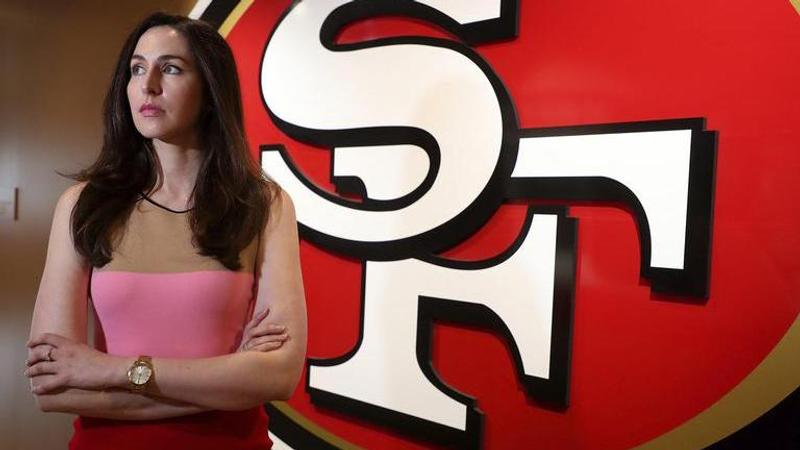Published 07:05 IST, March 30th 2021
AP Interview: 49ers' Hannah Gordon works for women's equity
When Hannah Gordon stepped into her role at the NFL's headquarters in 2009, she was the only woman working in the salary cap department who wasn’t a secretary

When Hannah Gordon stepped into her role at the NFL's headquarters in 2009, she was the only woman working in the salary cap department who wasn’t a secretary.
Now, as chief administrative officer and general counsel of the San Francisco 49ers, she accepts a challenge every time she enters a setting where she is the only woman.
“The biggest challenge is that you need to get more people like you into the room,” Gordon said in an interview from Santa Clara, California. “That is a weight that those of us who are different in some way often bear … we feel a sense of responsibility to not be the only one.”
Gender equity in the workplace is in the spotlight, notably at the NCAA Tournament. The largest governing body of college sports was forced to apologize after a wave of criticism and then provide the women’s basketball teams with workout facilities that matched those of the men .
Two Black female head coaches met for the first time ever in a tournament championship of a Power Five conference, illustrating how Black women account for a small number of coaches at the highest level of college basketball .
And just last week, U.S. women’s national soccer team players Megan Rapinoe and Margaret Purce met with President Joe Biden at the White House to discuss the wage gap on “Equal Pay Day.”
The problem extends beyond basketball courts and soccer fields, of course, with men accounting for a disproportionate number of executive level positions in front offices. A 2020 report card by The Institute for Diversity and Ethics in Sport gave the NFL a grade of C for gender hiring, based on positions at the league headquarters and within franchises. For CEOs or presidents and team senior administration, teams received an F for gender hiring.
Despite the obstacles, Gordon advanced through the ranks of professional football. She was the first female football beat writer at UCLA, she interned for the NFL Players Association and was a law clerk for the Oakland Raiders before going to work at the league office. After two years of helping manage lockouts, salary caps and collective bargaining for the NFL, she was recruited by the 49ers.
To get to her position, which involves leading legal and public affairs, strategic communications, risk management, fan engagement and community relations, Gordon relied on her competitive nature and taught herself not to take things personally when met with adversity.
“When I was in the league office, there was an individual who really did not like me and made my life quite unpleasant at times,” she said. “What I learned was that I had to not let that affect who I am.”
She stopped asking, “What is wrong with me?” and started asking, “What is wrong with the situation?”
The sense of self Gordon developed allowed her to have difficult conversations and make a place for herself in a male-dominated space. Even though she believes women are less inclined to invite conflict, she emphasizes a different skill set she exercised.
“I actually don’t think that women have any less ability to have difficult conversations with other people,” she said. “For the difficult conversation to actually be successful, you need to have excellent listening skills and empathy, and that’s something that women are socialized to have.”
She says changes in the number of female executives can start to happen through programs like the 49ers’ Denise DeBartolo York Fellowship, a one-year internship awarded to female college graduates.
“My goal is to open the door for anyone for whom the door is closed, whether it’s on the basis of gender or race or sexual orientation or national origin or language,” she said. “I think that the world is a much richer place when we all get to be who we are and when we all have a seat at the table.”
When hiring, in addition to adhering to the Rooney Rule requiring teams to interview minority candidates for high-level jobs, the Niners are committed to interviewing women and people of color for every full-time business operations position. Groups like 49ers B.U.I.L.D. (Black Unity In Leadership and Development) give employees resources and are driving change.
“Making their voices heard at the table is really important to provide feedback on who our social justice grantees are, on internal business decisions, on the hiring of a diversity equity and inclusion director,” she said. “So I’ve absolutely seen the difference that it makes when you have everyone at the table to speak up.”
Aside from the practices implemented by the 49ers, Gordon focuses on being a mentor and has released a book, “SZN of Change.” She hopes the “playbook” filled with exercises and quotes aids others in their quest for success.
“(The book) is everything I learned personally from my experience,” she said. “I think that many of us reach that point in our lives where we have lived enough that we have something to give back to the next generation of people.”
She sees the problems of the sports world as a broader reflection of society’s problems.
“When I look at what needs to change in sports, it’s the same things that need to change in finance, the same things we to change in tech, the same things we need to change in the law,” Gordon said. “When I look at sports, for me, it’s really how do we make all of society better and how can we be an example for that?”
Image credits: AP
Updated 07:06 IST, March 30th 2021




